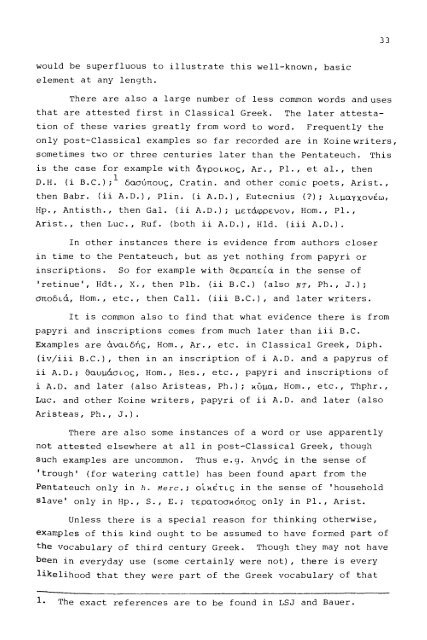A Lexical Study of the Septuagint Version of the Pentateuch
A Lexical Study of the Septuagint Version of the Pentateuch
A Lexical Study of the Septuagint Version of the Pentateuch
Create successful ePaper yourself
Turn your PDF publications into a flip-book with our unique Google optimized e-Paper software.
would be superfluous to illustrate this well-known, basic<br />
element at any length.<br />
There are also a large number <strong>of</strong> less common words and uses<br />
that are attested first in Classical Greek. The later attesta<br />
tion <strong>of</strong> <strong>the</strong>se varies greatly from word to word. Frequently <strong>the</strong><br />
only post-Classical examples so far recorded are in Koine writers,<br />
sometimes two or three centuries later than <strong>the</strong> <strong>Pentateuch</strong>. This<br />
is <strong>the</strong> case for example with αγροικος, Ar., Pl., et al., <strong>the</strong>n<br />
D.H. (i B.C.);"'" δασύτιους, Cratin. and o<strong>the</strong>r comic poets, Arist.,<br />
<strong>the</strong>n Babr. (ii A.D.), Plin. (i A.D.), Eutecnius (?) ; λιμαγχονέω,<br />
Hp., Antisth., <strong>the</strong>n Gal. (ii A.D.); μετάφρενον, Horn., Pl.,<br />
Arist., <strong>the</strong>n Luc, Ruf. (both ii A.D.), Hid. (iii A.D.).<br />
In o<strong>the</strong>r instances <strong>the</strong>re is evidence from authors closer<br />
in time to <strong>the</strong> <strong>Pentateuch</strong>, but as yet nothing from papyri or<br />
inscriptions. So for example with θεραπεία in <strong>the</strong> sense <strong>of</strong><br />
'retinue', Hdt., X., <strong>the</strong>n Plb. (ii B.C.) (also NT, Ph., J.);<br />
σποδιά, Horn., etc., <strong>the</strong>n Call, (iii B.C.), and later writers.<br />
It is common also to find that what evidence <strong>the</strong>re is from<br />
papyri and inscriptions comes from much later than iii B.C.<br />
Examples are αναιδής, Horn., Ar., etc. in Classical Greek, Diph.<br />
(iv/iii B.C.), <strong>the</strong>n in an inscription <strong>of</strong> i A.D. and a papyrus <strong>of</strong><br />
ii A.D.; θαυμάσιος, Horn., Hes., etc., papyri and inscriptions <strong>of</strong><br />
i A.D. and later (also Aristeas, Ph.); χΰμα, Horn., etc., Thphr.,<br />
Luc. and o<strong>the</strong>r Koine writers, papyri <strong>of</strong> ii A.D. and later (also<br />
Aristeas, Ph., J.).<br />
There are also some instances <strong>of</strong> a word or use apparently<br />
not attested elsewhere at all in post-Classical Greek, though<br />
such examples are uncommon. Thus e.g. ληνός in <strong>the</strong> sense <strong>of</strong><br />
'trough' (for watering cattle) has been found apart from <strong>the</strong><br />
<strong>Pentateuch</strong> only in h. Merc.; ο'ικε'τις in <strong>the</strong> sense <strong>of</strong> 'household<br />
slave' only in Hp., S., Ε.; τερατοσκόπος only in Pl., Arist.<br />
Unless <strong>the</strong>re is a special reason for thinking o<strong>the</strong>rwise,<br />
examples <strong>of</strong> this kind ought to be assumed to have formed part <strong>of</strong><br />
<strong>the</strong> vocabulary <strong>of</strong> third century Greek. Though <strong>the</strong>y may not have<br />
been in everyday use (some certainly were not), <strong>the</strong>re is every<br />
likelihood that <strong>the</strong>y were part <strong>of</strong> <strong>the</strong> Greek vocabulary <strong>of</strong> that<br />
1. The exact references are to be found in LSJ and Bauer.

















